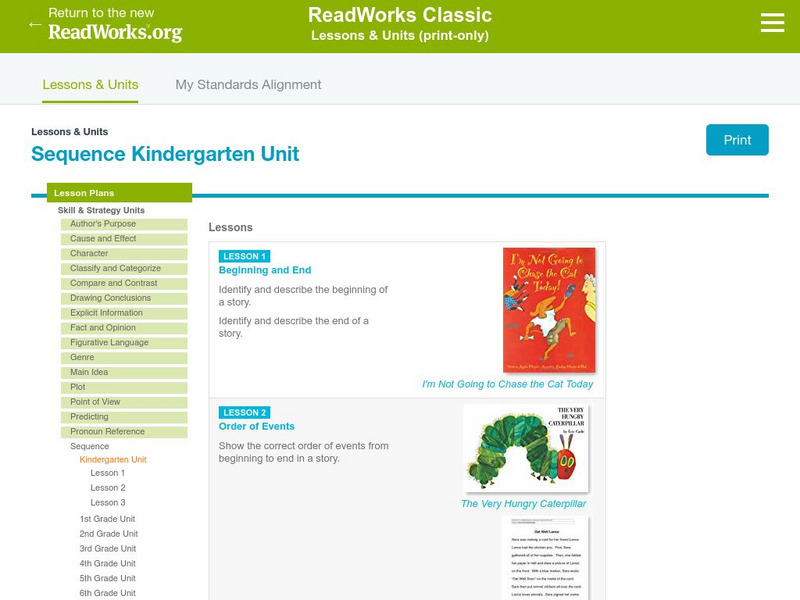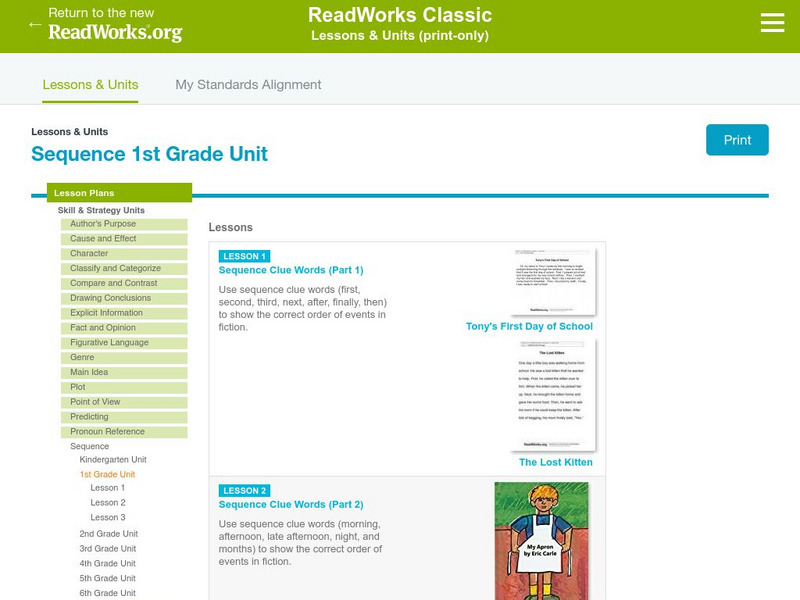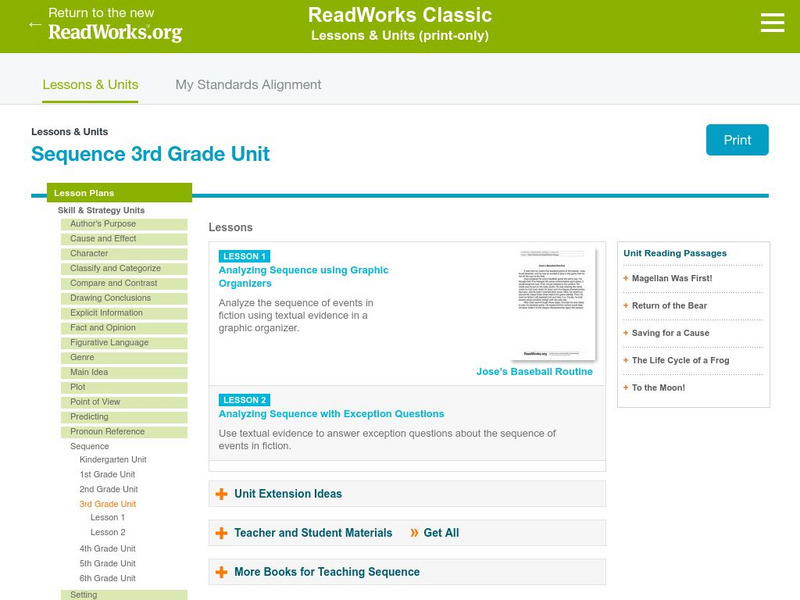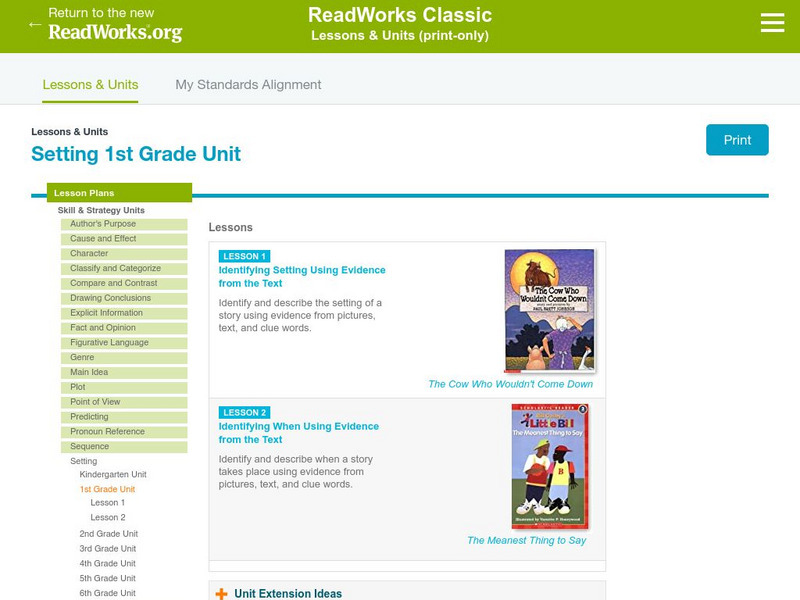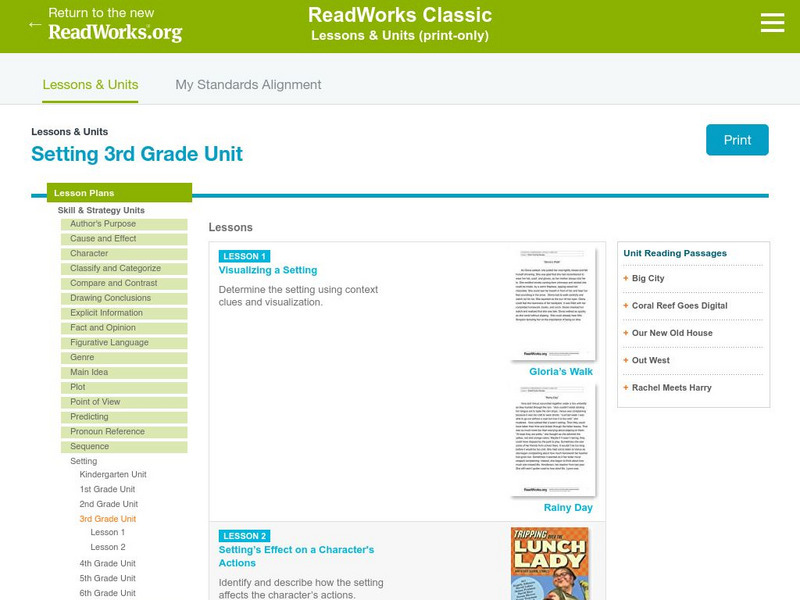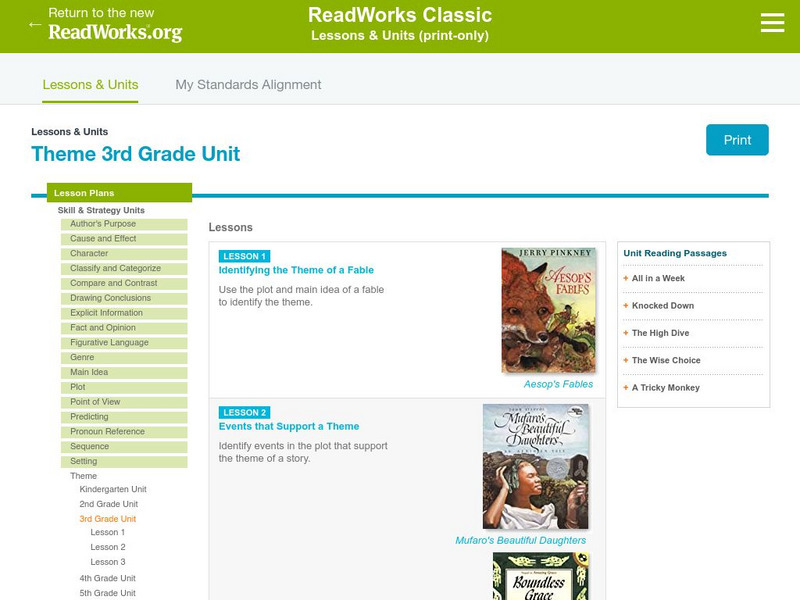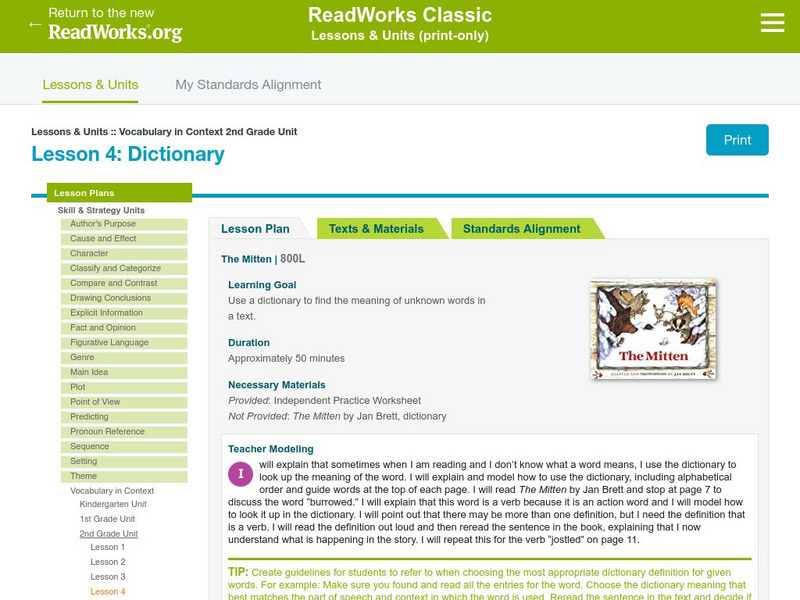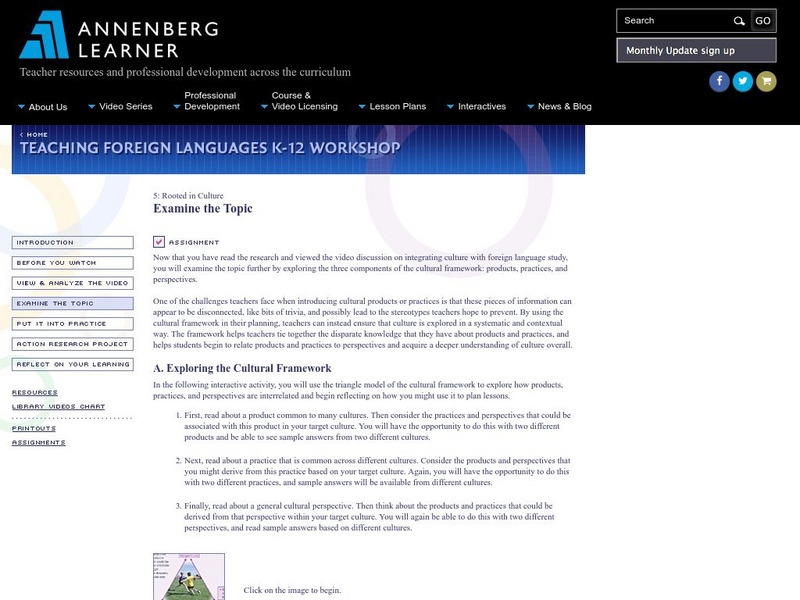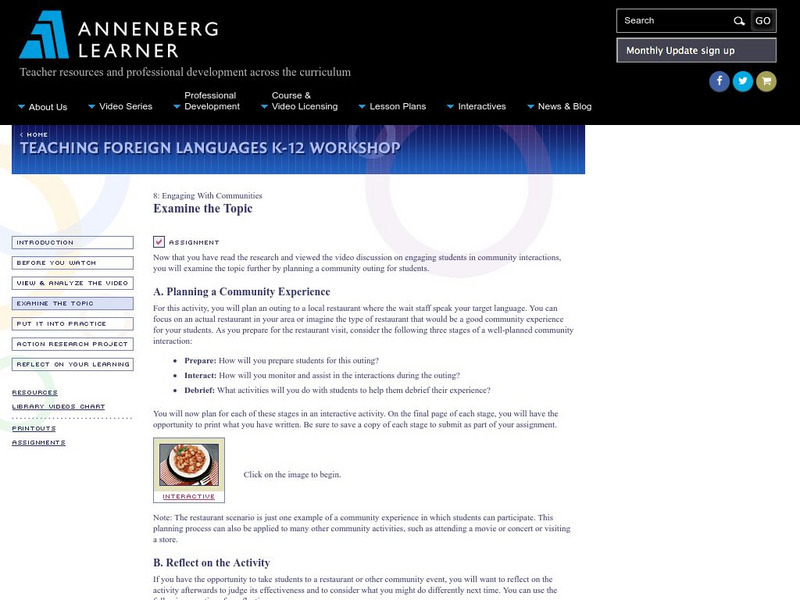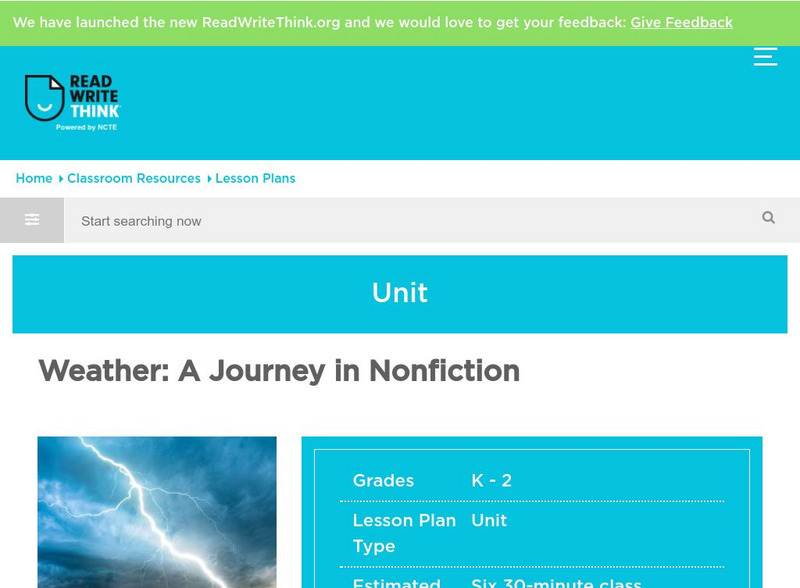Read Works
Read Works: Sequence Kindergarten Unit
[Free Registration/Login Required] A series of three lesson plans designed to teach young scholars to recognize the beginning and ending of a story and use word clues to put story events into the correct sequence. Lessons are based on...
Read Works
Read Works: Sequence 1st Grade Unit
[Free Registration/Login Required] This site provides a series of three lesson plans designed to teach young scholars to recognize and use word clues to put story events into the correct sequence and retell the story accordingly. Lessons...
Read Works
Read Works: Sequence 3rd Grade Unit
[Free Registration/Login Required] This website provides a series of two lesson plans designed to teach students to create a graphic organizer showing the sequence of events in a fiction text. The lessons include ideas for direct...
Read Works
Read Works: Sequence 2nd Grade Unit: Flashback Sequence
[Free Registration/Login Required] This lesson plan helps learners identify the sequence of events in a story with flashback. The lesson includes ideas for direct teaching, guided practice, and independent practice and utilizes the book...
Read Works
Read Works: Setting 1st Grade Unit
[Free Registration/Login Required] A series of three lesson plans designed to teach students to use pictures and word clues to determine the setting of fiction texts. Lessons are based on the books The Cow Who Wouldn't Come Down by Paul...
Read Works
Read Works: Setting 3rd Grade Unit
[Free Registration/Login Required] This is series of two lesson plans designed to teach students to visualize the setting and determine its effect on characters in a fiction text. Lessons are based on two short texts and the book...
Read Works
Read Works: Theme 3rd Grade Unit
[Free Registration/Login Required] This site provides a series of three lesson plans designed to teach students to identify and support the theme of a fable and a fiction selection based on main idea and supporting details. Lessons are...
Read Works
Read Works: Vocabulary in Context 2nd Grade Unit: Dictionary
[Free Registration/Login Required] This website provides a lesson plan in which students learn to use a dictionary to determine the meanings of unfamiliar words. The lesson plan utilizes the book The Mitten by Jan Brett and includes...
Teachnology
Teachnology: Stock Market Teaching Theme
The educational resource consists of lesson plans on how to teach students about the stock market. Lesson plans and tutorials are included.
Annenberg Foundation
Annenberg Learner: A New Identity
Students have written one-paragraph self-descriptions to send to other citizens of the new state they are creating. Read one of the paragraphs and work backwards through a series of prompts to determine the paragraph's audience, purpose,...
Annenberg Foundation
Annenberg Learner: The Village/state
Student groups have created ads for the new village/state they are creating to entice others to join them. Read one of the ads and work backwards through a series of prompts to determine the ad's audience, purpose, genre and theme.
Annenberg Foundation
Annenberg Learner: Spiraling Content Across Grade Bands
Read a lesson description from each grade band (elementary, middle, high school) and adapt the content from that grade band to the other two. Choose the same language and/or culture as the sample descriptions or one your are more...
Annenberg Foundation
Annenberg Learner: Exploring the Cultural Framework
Use the triangle model of the cultural framework to explore how products, practices and perspectives are interrelated. Compare two different products, practices and perspectives and see sample answers for each from two different cultures.
Annenberg Foundation
Annenberg Learner: Analyzing a Project Description
Read the project description for students creating a children's storybook. Analyze the text based on five elements (describe task, achieve authenticity, establish criteria, clarify strategies, communicate rubric).
Annenberg Foundation
Annenberg Learner: Engaging With Communities
Plan an outing to a local restaurant where the wait staff speak your target language. Consider how you will prepare your students, monitor interactions during the visit and debrief afterwards.
Media Smarts
Media Awareness Network: What's in a Word? Lesson Plan
Help 5th through 7th graders explore the power of words and their capacity to influence our thinking with this lesson from the Media Awareness Network. An easy-to-print .pdf version is linked from the top of the page.
ReadWriteThink
Read Write Think: Thoughtful Threads: Sparking Rich Online Discussions
Today's learners love chatting online with friends. This lesson combines that love with literature. Students form literature circles and have meaningful online discussions about a literary work.
ReadWriteThink
Read Write Think: Comic Makeovers: Examining Race,class,ethnicity,and Genderin Media
Students explore stereotypes in the media and representations of race, class, ethnicity, and gender by analyzing comics over a two-week period and then re-envisioning them with a "comic character makeover."
PBS
Pbs Learning Media: Nature: Cloud Age Four
In this short Nature video, experience the environment of Cloud, a four-year old horse living in the wild. This is one in a series of three videos about Cloud. [2:23]
ReadWriteThink
Read Write Think: Reading Informational Texts Using the 3 2 1 Strategy
Students can count on using the 3-2-1 strategy to help them successfully comprehend and write about an informational text.
Read Works
Read Works: Vocabulary in Context 2nd Grade Unit: Context Clues
[Free Registration/Login Required] This is a lesson in which students learn to use context clues in surrounding sentences to determine the meanings of unfamiliar words. The lesson utilizes the book The Life Cycle of an Emperor Penguin by...
ReadWriteThink
Read Write Think: Weather: A Journey in Nonfiction
Questions about weather clear up when students use what they learned from their books to create a presentation to share with the rest of the class.
ReadWriteThink
Read Write Think: Using Comprehension Strategies With Elie Wiesel's Night
Working in small groups, young scholars read and discuss Elie Wiesel's memoir Night and then take turns assuming the "teacher" role, as the class works with four different comprehension strategies.RI.11-12.4 Word meaning, RI.11-12.10b...
ReadWriteThink
Read Write Think: Reading/writing About Whales Using Fiction and Nonfiction Texts
Students will have a whale of a good time in this lesson in which they use fiction and nonfiction texts to write a letter to an online scientist.


